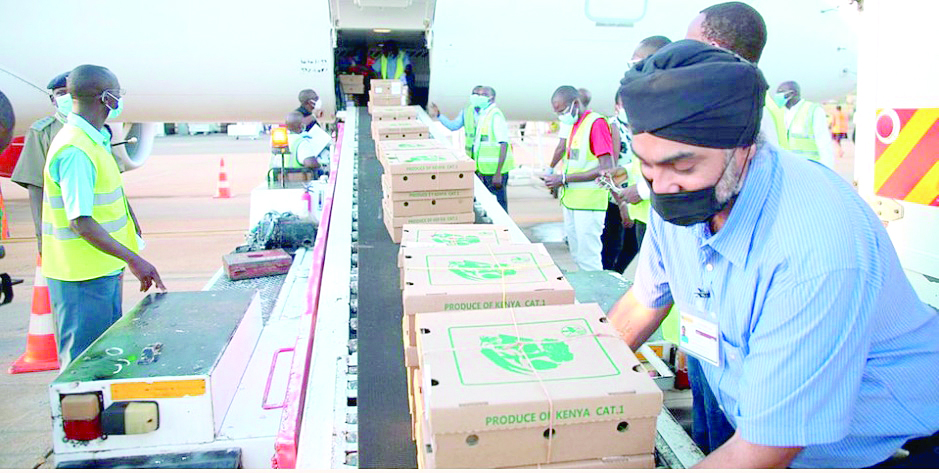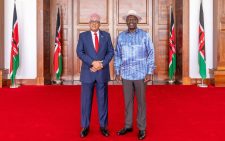Kenyan exporters in eye of Trump’s worldwide storm

Kenya’s exporters are bracing for the impact of a new 10 per cent tariff imposed by the United States (U.S.) under President Donald Trump’s sweeping protectionist agenda.
The levy, part of Trump’s “Freedom Day” trade overhaul, raises the cost of Kenyan goods entering the U.S. market, posing a fresh challenge to one of Kenya’s key export destinations.
However, as competitors like Vietnam (46 per cent), Sri Lanka (44 per cent), and Bangladesh (37 per cent) face significantly steeper duties, authorities see an opportunity to position Kenya as a preferred sourcing hub for American buyers.
“The new tariff policy by the United States presents both challenges and opportunities for Kenya. While Kenyan exports to the U.S. will now face a 10 per cent tariff, this is significantly lower than the rates imposed on key textile-exporting competitors,” said Lee Kinyanjui, Cabinet Secretary, Ministry of Investment, Trade, and Industry (MITI).
Kenya’s trade with the U.S. is valued at approximately $543 million (about Sh70 billion) annually, with textiles, agricultural products, and specialty goods such as cut flowers dominating its export portfolio.
The U.S. market has been a crucial outlet for Kenyan manufacturers, particularly through the African Growth and Opportunity Act (AGOA), which provides preferential trade access. With the new tariffs in place, Kenyan exporters will need to recalibrate supply chains and pricing structures to maintain their competitive edge.
While the 10 per cent tariff increases costs for Kenyan businesses, the government is betting on its lower comparative duty to attract new orders from U.S. importers seeking alternatives to higher-tariff nations.
Focus on protectionist pivot
“Kenya has untapped opportunities to broaden its manufacturing base, notably in apparel, leather, and agro-processing, as competing nations face higher trade barriers,” Kinyanjui said in a press statement.
However, the wider implications of Trump’s protectionist pivot extend beyond Kenya’s direct trade with the U.S. The tariffs also target key Kenyan trading partners, including China, India, and the UAE, disrupting global supply chains that feed into the country’s import-dependent economy.
China, Kenya’s largest supplier, faces tariffs of up to 60 percent on its exports to the U.S., which could slow its economic growth and indirectly affect its trading relationship with Kenya. Similarly, India and the United Arab Emirates (UAE), Kenya’s second- and third-largest import partners, will also see costlier exports to the U.S., potentially leading to higher prices for goods that Kenya sources from these nations.
Reshoring agenda
Kenya’s vulnerability to external shocks is underscored by its widening trade deficit, which stood at Sh142 billion in January 2025. Imports account for over 21 percent of Gross Domestic Product (GDP), while exports contribute just 12 percent, making the country heavily reliant on foreign goods and services.
Trump’s reshoring agenda, designed to bring manufacturing back to the U.S., could further challenge economies like Kenya’s, which depend on globalized production networks.
To mitigate these risks, Kenya must diversify its trade partnerships and improve domestic manufacturing. Trade with the UK has been growing steadily, with imports reaching £1 billion (about Sh169.6 billion) and exports hitting £735 million (about Sh124.9 billion) by the third quarter of 2024, signaling a shift toward reducing dependence on traditional partners like the U.S. Additionally, regional integration efforts under the African Continental Free Trade Area (AfCFTA) present a strategic pathway for Kenya to deepen intra-African trade, offering a buffer against geopolitical and trade policy shifts in the West.
“The major challenge posed by the U.S. reciprocal tariff is the increased costs for Kenyan exports,” Kinyanjui acknowledged.
“While the 10 per cent tariff is lower than our competitors’, it still raises costs for Kenyan businesses exporting to the U.S. Supply chain adjustments will be necessary, such as expanding production to meet new demand. This will require investment in infrastructure, technology, and skills development,” the CS said.













